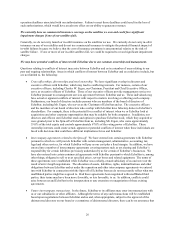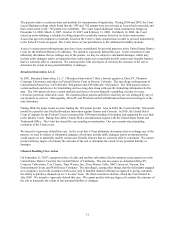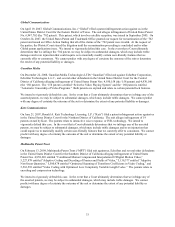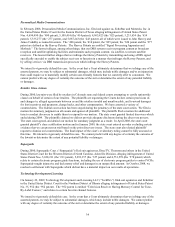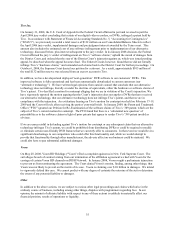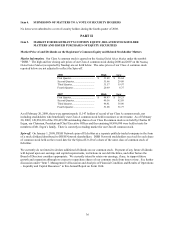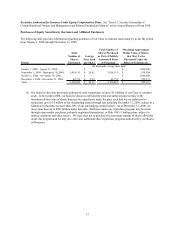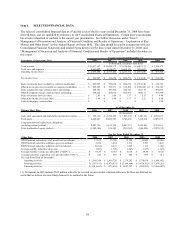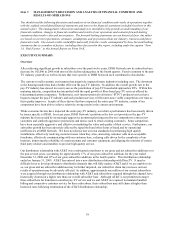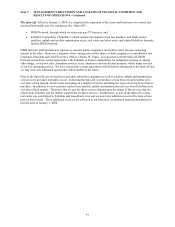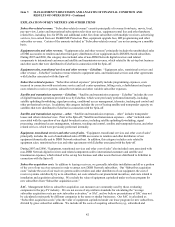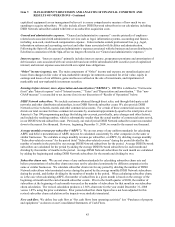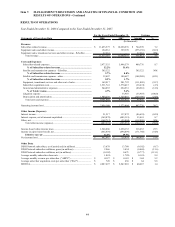Dish Network 2008 Annual Report Download - page 44
Download and view the complete annual report
Please find page 44 of the 2008 Dish Network annual report below. You can navigate through the pages in the report by either clicking on the pages listed below, or by using the keyword search tool below to find specific information within the annual report.34
Personalized Media Communications
In February 2008, Personalized Media Communications, Inc. filed suit against us, EchoStar and Motorola, Inc. in
the United States District Court for the Eastern District of Texas alleging infringement of United States Patent
Nos. 4,694,490 (the ‘490 patent), 5,109,414 (the ‘414 patent), 4,965,825 (the ‘825 patent), 5,233,654 (the ‘654
patent), 5,335,277 (the ‘277 patent), and 5,887,243 (the ‘243 patent), all of which were issued to John Harvey and
James Cuddihy as named inventors. The ‘490 patent, the ‘414 patent, the ‘825 patent, the ‘654 patent and the ‘277
patent are defined as the Harvey Patents. The Harvey Patents are entitled “Signal Processing Apparatus and
Methods.” The lawsuit alleges, among other things, that our DBS system receives program content at broadcast
reception and satellite uplinking facilities and transmits such program content, via satellite, to remote satellite
receivers. The lawsuit further alleges that we infringe the Harvey Patents by transmitting and using a DBS signal
specifically encoded to enable the subject receivers to function in a manner that infringes the Harvey Patents, and
by selling services via DBS transmission processes which infringe the Harvey Patents.
We intend to vigorously defend this case. In the event that a Court ultimately determines that we infringe any of the
asserted patents, we may be subject to substantial damages, which may include treble damages and/or an injunction
that could require us to materially modify certain user-friendly features that we currently offer to consumers. We
cannot predict with any degree of certainty the outcome of the suit or determine the extent of any potential liability
or damages.
Retailer Class Actions
During 2000, lawsuits were filed by retailers in Colorado state and federal courts attempting to certify nationwide
classes on behalf of certain of our retailers. The plaintiffs are requesting the Courts declare certain provisions of,
and changes to, alleged agreements between us and the retailers invalid and unenforceable, and to award damages
for lost incentives and payments, charge backs, and other compensation. We have asserted a variety of
counterclaims. The federal court action has been stayed during the pendency of the state court action. We filed a
motion for summary judgment on all counts and against all plaintiffs. The plaintiffs filed a motion for additional
time to conduct discovery to enable them to respond to our motion. The state court granted limited discovery which
ended during 2004. The plaintiffs claimed we did not provide adequate disclosure during the discovery process.
The state court agreed, and denied our motion for summary judgment as a result. In April 2008, the state court
granted plaintiff’s class certification motion and in January 2009, the state court entered an order excluding certain
evidence that we can present at trial based on the prior discovery issues. The state court also denied plaintiffs’
request to dismiss our counterclaims. The final impact of the court’s evidentiary ruling cannot be fully assessed at
this time. We intend to vigorously defend this case. We cannot predict with any degree of certainty the outcome of
the lawsuit or determine the extent of any potential liability or damages.
Superguide
During 2000, Superguide Corp. (“Superguide”) filed suit against us, DirecTV, Thomson and others in the United
States District Court for the Western District of North Carolina, Asheville Division, alleging infringement of United
States Patent Nos. 5,038,211 (the ‘211 patent), 5,293,357 (the ‘357 patent) and 4,751,578 (the ‘578 patent) which
relate to certain electronic program guide functions, including the use of electronic program guides to control VCRs.
Superguide sought injunctive and declaratory relief and damages in an unspecified amount. In October 2008, we
reached a settlement with Superguide which did not have a material impact on our results of operations.
Technology Development Licensing
On January 22, 2009, Technology Development and Licensing LLC (“TechDev”) filed suit against us and EchoStar
in the United States District Court for the Northern District of Illinois alleging infringement of United States Patent
No. 35, 952 (the ‘952 patent). The ‘952 patent is entitled “Television Receiver Having Memory Control for Tune-
By-Label Feature,” and relates to certain favorite channel features.
We intend to vigorously defend this case. In the event that a Court ultimately determines that we infringe any of the
asserted patents, we may be subject to substantial damages, which may include treble damages. We cannot predict
with any degree of certainty the outcome of the suit or determine the extent of any potential liability or damages.




